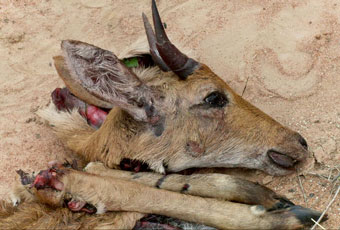
By Jocelyn Edwards
When rangers discovered the remains of the only male reedbuck in Kabwoya Park in the sack of a Tullow Oil contractor, they found what are perhaps the first signs of the impact that oil exploration will have in one of Uganda’s protected regions.
Authorities got concerned when they identified the animal killed in November 2009 as a reedbuck that had been transported to Kabwoya from Lake Mburo National Park to mate with the few females there and bring up the population. “We had spent resources on it and then it was killed so you can imagine how disappointing it was,” said Sam Mwandha, director of conservation for the Uganda Wildlife Authority.
Six oil workers of Tullow Oil contractor, Busitema Mining Services, were arrested in connection with the incident.
According to Mwandha there has been an increase in poaching since the activities of oil started in Kabwoya and Murchison Falls National Park.
Murchison Falls has been named a world heritage site for its many species of rare birds and wildlife. Kabwoya, meanwhile, suffered for years from the disappearance of many of its indigenous species. Recently however, the UWA and Lake Albert Safaris have had some success with a project to restock the area with wildlife.
About half of oil exploration Block 1, jointly owned by Tullow and Heritage Oil, is located inside these protected areas.
Mwandha said that the UWA wrote to the Ministry of Energy this month to say that the oil camps should be moved out of protected areas and the workers only brought in during the day.
In an email statement, Tullow said that, as of yet, it has not received notification from government that operational procedures should change and oil development activities will continue as previously agreed with the Ministry of Energy.
The company maintains that the reedbuck incident is the only one of an animal being killed that has been associated with oil development in the area. “(The company) continues to work with the UWA to minimize the threat of poaching in our operational area,” it said.
However, according to UWA statistics, the number of snares found in Murchison Falls more than doubled with the increase of oil activity in the park in 2008. Up to 531 traps were found in the park in 2007; 1,357 were discovered in 2008. Last year, parks rangers found 1,225 snares.
Park ranger Ghad Mugiri blames the presence of oil workers from local communities as well as an increase in materials available to be used for traps.
Spare electrical cables and chain link used by oil companies have provided convenient materials for workers to fashion traps with. “At times they would leave them unattended to and (local) people would get a chance to steal them.”
Locals poach animals to eat as well as sell in the lucrative bush meat market.
While the poachers mainly target antelope, traps have ended up getting larger animals as well. “They (the traps) do not discriminate so one snare you have set for a Ugandan cob could end up getting the trunk of a elephant and causing it great pain and possibly even death. We have had to rescue many of the bigger (animals): giraffes, lions and elephants,” said Mwandha.
Just the Beginning
Some civil society activists say poaching is just the tip of the iceberg for the negative impact that oil development will have on Uganda’s natural heritage.
Dickens Kamugisha is the head of the Africa Institute for Energy Governance (Afiego). “Poaching is such a small thing that is happening, but it’s evidence that very many other things will happen,” he said. As the oil found in the parks starts flowing, the effects on the environment will only escalate, he said. Flaring will create noise and light that might scare away wildlife while the construction of a pipeline to transport the oil will only bring in more workers.
But the most dangerous thing about the oil exploration going on in the parks, Kamugisha said, is the dangerous legal precedent that it sets for the future. The Uganda Wildlife Act prohibits activities such as cultivation of land and prospecting for minerals or mining in parks. In order for such a prohibited activity to take place in a reserve, the executive director must be satisfied that it is “in the interests of better wildlife management.”
“These laws that are being violated become useless,” says Kamugisha.
Environmentalist and founder of Greenwatch, Kenneth Kakuru does not mince words on the issue. Oil companies should leave, he said. “The Uganda Wildlife Authority was wrong in the first place to give them permission to enter and undertake activity in the parks. What they are doing is illegal; the law says no such activity should take place. They should vacate the park immediately. They have no business being there.”
But it’s likely that the activists will have trouble convincing the government that oil exploration in the area should be halted entirely. The companies maintain that Block 1 contains at least 400 million barrels of oil, the royalties of which provide strong incentive to leave environmental concerns out in the wild.
 The Independent Uganda: You get the Truth we Pay the Price
The Independent Uganda: You get the Truth we Pay the Price


